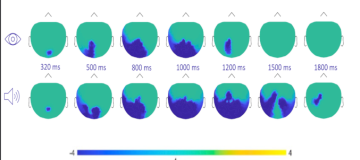
Sensory modality affects the spatiotemporal dynamics of alpha and theta oscillations associated with prospective memory
This research investigates the neurophysiological activity associated with intention maintenance during a Prospective Memory task, analyzing the differences associated with the presentation of the task in different sensory modalities (Auditory vs. Visual). In the Alpha band, the neural markers underlying intention maintenance were similar between sensory modalities, presenting similar topographical and temporal properties. Thus, Alpha decreases seems to underlie supra modal, top-down processes such as Strategic Monitoring (external attention directed to the recognition of the stimuli associated with the intention) independently from modality. On the contrary, the clusters of Theta activity presented different spatiotemporal patterns in the visual and the auditory version of the task, developing over sensory region (occipital and temporal, respectively). Furthermore, the regions and the time windows resulted to reflect the ones in which the lexicality effect (integration of a string of letters in the word and its associated concept) occurs in the two modalities. Hence, Theta oscillations resulted to represent more modality-dependent processes, and their decreases may be interpreted as a reduced focus on the ongoing activity (Lexical Decision Task), related to the usurpation of cognitive resources in favor of the maintenance of the intention in memory.
Overall, the involvement of different sensory modalities in the study of Prospective Memory allowed to shed light on the supra modal nature of some processes (Strategic Monitoring) and neural oscillations (Alpha), while giving the chance to find new interpretations to less understood neural mechanisms (Theta decreases).
Info: Vicentin, S., Cona, G., Arcara, G., & Bisiacchi, P. (2024). Sensory modality affects the spatiotemporal dynamics of alpha and theta oscillations associated with prospective memory. International Journal of Psychophysiology, 196, 112284.





